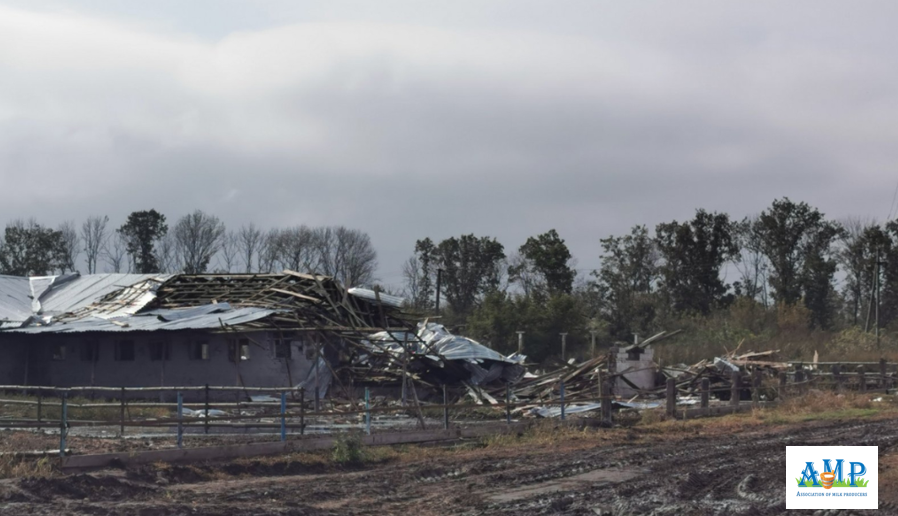Dairy farms in the de-occupied and near-front areas without demining will NOT be able to prepare coarse fodder for livestock and will be forced to significantly reduce or completely CLOSE THE DAIRY DIRECTION.
For Ukraine, this means:
- Loss of jobs, incentive for people to return to their homes.
- Loss of investment. We emphasize: investment losses are a critical factor in dairy farming, because it takes at least 10 years to recover them. Therefore, having lost the farm, the owner will no longer risk investing in dairy farming.
- Loss of budget revenues: dairy farms are among the largest taxpayers.
- Loss of food security and export potential.
We consider it a priority and call for urgent steps for humanitarian demining of agricultural lands of dairy farms from the de-occupied territories of Kharkiv and Kherson regions.
Farms that could not physically carry out economic activities for half a year or more, cannot pay for demining services and risk being doomed to bankruptcy, because they lost 30-70% of their dairy herds, experienced significant destruction of production premises, warehouses, agricultural machinery, due to fires lost a potential harvest or did not harvest a single hectare due to mining.
But at the same time, enterprises from the territories affected by the war do not leave their farms - because the survival of entire communities, our Ukrainians who survived the occupation, depends on their work. They continue to support the Armed Forces and work for victory.
Different tariffs for demining are being heard — from 24 to 150 thousand UAH/ha. But none of the farms that need demining will be able to master them.
For understanding: the average yield of wheat in 2022 was 4 t/ha, the average price of fodder wheat for the 1st quarter of 2023 was UAH 6,000/t, i.e., from 1 hectare of wheat, farmers could potentially receive the same 24,000 UAH UAH
Oleksandr Sazonov, director of "Agroservice LTD", Kharkiv Region: "More than 2 out of 6,000 hectares of farm land need urgent demining. The line of demarcation passed through our fields and there was very dense mining, not to mention the anti-personnel mines or remnants of shelling that were literally showered on us.
During 2022, during the occupation, we were unable to physically harvest ANY forage, livestock are now eating the leftovers from the 2021 harvest.
Immediately after the liberation, they thought about how to quickly increase the number of 400 cows that died due to shelling, in order to restore jobs and pre-war milk production. This idea has now been abandoned. If there is no demining, we risk being forced to cut at least 30% of cows. Before the war, 155 workers were constantly working on the farm. If we close the dairy department, 130 of them will lose their jobs."
Petro Shtupun, director of TOV "SK VOSTOK", Kharkiv region: "Currently, the company has 300 hectares of unmined land. Of them, 250 hectares of them were hit and unexploded shells lie.
The district emergency services have detailed information about our situation, but now their priority is to demine municipal enterprises, and it is not known when it will be the turn of agricultural lands.
Private structures that offer demining for insane amounts have proven themselves very badly. Neighboring enterprises that used their services have huge losses both in equipment and in people, because they are simply blown up by mines. We are looking for support and opportunities for humanitarian demining.”
Vasyl Kalgan, director of AF "Bazaliіvskyi Kolos", Kharkiv region: "If there is no demining, we will completely lose not only the direction of animal husbandry, but also the economy in general. We have NO field that has been explored. Stocks of fodder for cows will last only until July this year. It is critical to clear the fields during the summer. This will give us a chance to save the farm.”
Halyna Golovko, head of STOV "Mriya", Kharkiv region: "Due to hostilities and occupation, only two dairy farms survived in our Kupyan district: ours and one more. Before the war, we had 3 times milking and handed over 32 tons of milk for processing. In January 2023, due to blackouts and shelling, they reached 1-time milking and 8 tons of milk. As a result of shelling, two grain warehouses of 6,000 tons were lost. But they survived! We continue to provide milk and meat to our population, for the needs of the Armed Forces and hospitals, we help to rebuild destroyed roads and bridges, and we did not delay the salaries of our employees even during the occupation.
However, waiting for the release, it will be unrealistic for us to resume the operation of the farm without urgent humanitarian demining of the fields.
According to preliminary estimates, more than 3,000 hectares of land that we cultivate have been contaminated by shells and mined. In order to grow fodder and maintain the herd, we need to demine at least 1,000 hectares. But with current tariffs from commercial companies, we have no chance. If we do not find a humanitarian solution, then we will be forced to sell cattle for meat, which were saved by such great efforts during hostilities."
General Director of AMP Hanna Lavreniuk emphasizes that with the current tariffs for inspection and demining, it is impossible for farms that have been under occupation for more than six months to cope with such a challenge without humanitarian support: "If the issue is not resolved, we can expect a new wave of industrial livestock reduction in the same Kharkiv region, which during the period of occupation has already lost more than 50% of dairy farm cows."
Press service of the Association of Milk Producers


